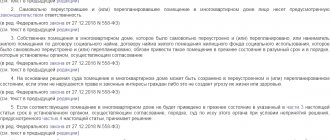Statement of claim for the recovery of a penalty from the developer in case of violation of the deadline for transferring an apartment under the DDU
First, the laws on the requirement of compensation: In accordance with paragraph 9 of Article 4 of the Federal Law of December 30, 2004 No. 214-FZ to relations arising from an agreement for participation in shared construction, concluded by a citizen for the purpose of acquiring ownership of residential premises and other real estate exclusively for personal, family, household, household and other needs not related to business activities, legislation on the protection of consumer rights is applied to the extent not regulated by this law.
In accordance with paragraph 45 of the Resolution of the Plenum of the Supreme Court of the Russian Federation dated June 28, 2012 N 17 “On the consideration by courts of civil cases in disputes regarding the protection of consumer rights”, when the court decides the issue of compensation for moral damage to the consumer, a sufficient condition for satisfying the claim is the established fact of violation of rights consumer. The amount of compensation for moral damage is determined by the court regardless of the amount of compensation for property damage, and therefore the amount of monetary compensation collected for compensation for moral damage cannot be made dependent on the cost of the goods (work, service) or the amount of the penalty to be collected.
Thus, when the court decides on the issue of compensation for moral damage to the consumer, a sufficient condition for satisfying the claim is the established fact of violation of the consumer’s rights.
The actions of the Defendant caused the Plaintiff/Plaintiffs significant moral harm, since the Plaintiff/Plaintiffs were deprived of the opportunity to move into the paid housing, which caused serious distress and moral suffering.
Now a description of the situation with the amount of compensation. Example No. 1: The plaintiff is married and has two minor children born in 2011 and 2021. Wanting to improve the living conditions of his family, the Plaintiff entered into an agreement with the Defendant, to pay for which he used all his savings, and was also forced to take out a loan from a bank, which he is currently regularly repaying. In addition, the Plaintiff is dependent on his elderly parents, who are pensioners, do not work anywhere and need constant financial support.
At the time of concluding the agreement for participation in shared construction, the Plaintiff was considering several options for apartments for purchase in other residential complexes, where the transfer deadline was set for 2020, but the price of apartments was 20-30% lower. The sales manager of the Defendant's company argued that the high price of the agreement for participation in shared construction was due, among other things, to the deadline for transferring the apartment to the Plaintiff. Thus, by violating the deadlines for transferring the apartment to the Plaintiff for a period of more than 4 months, the Defendant received a significant economic benefit by concluding a shared construction participation agreement with the Plaintiff, which provided for earlier deadlines for transferring the apartment, and, accordingly, a higher contract price.
In accordance with Article 15 of the Law of the Russian Federation of February 7, 1992 No. 2300-1 “On the Protection of Consumer Rights”, moral damage caused to the consumer as a result of violation by the manufacturer (performer, seller, authorized organization or authorized individual entrepreneur, importer) of consumer rights provided for by laws and legal acts of the Russian Federation regulating relations in the field of consumer rights protection are subject to compensation by the causer of harm if he is at fault.
In this case, the Plaintiff considers fair compensation for moral damage equal to 50,000 rubles.
Example No. 2: Wanting to improve their living conditions, the Plaintiffs entered into an Agreement with the Defendant, to pay for which they used all their savings. The situation is complicated by the fact that the Plaintiffs are dependent on their elderly parents, who are pensioners and need constant financial support. In addition, the father of Plaintiff 2 is a third group disabled person and needs constant care and attention.
In this case, the Plaintiffs consider fair compensation for moral damage equal to 50,000 rubles for each of the Plaintiffs.
Example No. 3. Plaintiffs are husband and wife, have two minor children, Plaintiff 1 is currently pregnant. The plaintiffs do not own any housing, they are registered in the apartment of the brother of Plaintiff 1. The plaintiffs lived for a long period in the city of Mytishchi, where they rented an apartment. Wanting to improve their living conditions, the Plaintiffs entered into an Agreement with the Defendant, to pay for which they used all their savings, which they had accumulated throughout their lives.
Plaintiff 4 is disabled since childhood, is currently a full-time student and cannot help his family financially. Plaintiff 2 is a veteran of the Ministry of Internal Affairs.
The situation is complicated by the fact that the parents of Plaintiff 1 are pensioners, do not work, and therefore require constant financial support. In 2021, Ivanov S.V. died. – the father of Plaintiff 2, the mother of Plaintiff 2 is left alone, is a pensioner, and needs constant care and financial support.
In this case, the Plaintiffs consider fair compensation for moral damage equal to 100,000 rubles for each of the Plaintiffs.
Complaint to the developer for violation of delivery deadlines.
___________________________________
___________________________________
___________________________________
___________________________________
___________________________________
CLAIM
on payment of a penalty for violation of the transfer deadline
participant in shared construction of a shared construction project
and on the transfer of a shared construction project
“___” __________ 20__ between me, on the one hand, and the Limited Liability Company “______________________”, on the other hand, an agreement for participation in shared construction No. _________ was concluded.
In accordance with the terms of this agreement, LLC "_________" undertook to build on the land plot a ___-apartment __-storey residential building with built-in and attached premises with a total area of ____ sq.m., located at the construction address: _________________, and after receiving permission for commissioning of an apartment building shall be transferred to me as a participant in shared construction. The object of shared construction is a ____room apartment with a conditional number No. ___, located in the ________ entrance, on the ____ floor, with a total project area of _____ sq.m., living area of ____ sq.m.
In turn, I undertook to take part in the financing of the construction of the specified house in terms of the construction of a one-room apartment, pay its cost in the amount of __________ rubles _______ kopecks, take ownership of the shared construction object, and also fulfill other contractual obligations.
I fulfilled my contractual obligations on time and in full, including the obligation to pay the cost of the apartment.
Meanwhile, LLC “__________” has not yet fulfilled its obligation to build an apartment building and transfer the shared construction project to me under the transfer and acceptance certificate no later than “___” ___________ 20__.
Part 2 of Article 6 of the Federal Law of the Russian Federation of December 30, 2004 No. 214-FZ “On participation in shared construction of apartment buildings and other real estate and on amendments to certain legislative acts of the Russian Federation” establishes that in case of violation of the transfer period stipulated by the contract To the participant in shared construction of a shared construction project, the developer pays to the participant in shared construction a penalty (penalty) in the amount of one three hundredth of the refinancing rate of the Central Bank of the Russian Federation, valid on the day of fulfillment of the obligation, of the contract price for each day of delay. If the participant in shared construction is a citizen, the penalty (penalty) provided for in this part is paid by the developer in double the amount.
Currently, the refinancing rate is equal to the key rate, the size of which is also set by the Central Bank of the Russian Federation, and currently its size is 11% per annum.
Due to the fact that LLC "___________" has not yet fulfilled its obligation to transfer the Shared Construction Project, the amount of the penalty as of the time of filing this claim, according to the calculation below, is _______ rubles _______ kopecks.
Contract price: ________ rubles
Number of days overdue: _____ days (from __.__.20__ to __.__.20__)
Key rate: 11%
0.11: 150 x ___ days x _____ rubles = _____ rub. ___ kop.
Clause ____ of the agreement for participation in shared construction provides for a mandatory claim procedure for resolving disputes, according to which claims are considered within ___ days from the date of receipt.
Taking into account the above, and guided by Article 6 of the Federal Law of the Russian Federation of December 30, 2004 No. 214-FZ “On participation in shared construction of apartment buildings and other real estate and on introducing amendments to certain legislative acts of the Russian Federation,” I ask you no later than ____ days from receipt of this request:
— pay me a penalty for violating the deadline for transfer of a shared construction project in the amount of _____ rubles ______ kopecks for the period from “___” __________ 20__ to “___” ___________ 20__;
- transfer to me, according to the transfer deed, a shared construction project - - ____room apartment with conditional number No. ___, located in the ________ entrance, on the ____ floor, with a total area according to the project _____ sq.m., living area ____ sq.m.;
— pay me a penalty calculated for the day of transfer of the Shared Construction Project.
Please inform me of your decision in writing.
If these requirements are not fulfilled voluntarily, I will be forced to contact Rospotrebnadzor with a complaint against the actions of ____________ LLC and with a statement of claim to the court for the collection of a penalty, compensation for moral damages and a fine to the state for failure to comply with the voluntary procedure for satisfying consumer requirements.
Details for transferring the penalty:
__________________________________
__________________________________
__________________________________
_______ /_________________/
"___" ______________ 20__
Penalty under DDU
The article is voluminous, in short, you need to file a claim against the developer as soon as there is a delay in delivery of the apartment. It is realistic and obligatory to collect if you need extra money. In the article about the main issues regarding penalties. For residents of Crimea, a bonus is a small analysis of developers.
How does a developer make money on delivery dates?
The shareholder’s problem with the timing of obtaining housing is his personal one. The developer began receiving money for the apartment at the foundation pit stage. Enterprising speculators, without fear of the 13% tax, sell apartments as soon as it becomes clear to the general population that housing is in a convenient location and is worth the money. As a rule, this happens during the construction of the first four floors. Among ordinary mortals, these are the people who stand to benefit in a situation with a developer.
In just six months, capitalization reaches 0.5 - 1.5 million rubles. The developer also sells apartments independently. Usually he does this through a developer company. Since speculation in the real estate market forces the price for the end consumer to increase, the sale period for apartments is delayed. Those citizens who buy apartments for themselves begin to wait patiently. Not all shareholders go to court, so it can be cost-effective for the developer to wait to hand over the keys. Sometimes a shareholder cannot complete construction for objective reasons. For example, the administration refuses to accept the house for use.
To protect citizens, the legislator has not yet come up with anything better than collecting a penalty. And believe me, this mechanism really works and allows you to compensate for the wasted time.
Why is there a need to rush? Out of 10 developers, 7 withdraw money. The scheme is banal as hell. For any project, subcontractors are involved from among our own. They sometimes perform almost all construction work for the developer’s money. Checking all subcontractors is a time-consuming and troublesome task for officials. Until the truth is established, the developer will either complete construction of the facility or go bankrupt.
There are no unsold apartments - they are already in the pocket LLC. However, the developer cannot always withdraw money immediately. Because of this, regulatory authorities will start asking questions to the developer. Therefore, each developer has a movement in the account until the delivery of the last apartment. From the moment of delivery, after 12 months, the developer, as a rule, has no money left. Except in cases where the developer has taken over another property or is a bona fide businessman.
The main mistake of the equity holder is to wait for the act of acceptance and transfer
Someone is afraid that the apartment will not be given to him. Which is absolutely in vain, if the developer could not put the house into operation, then he will not be able to give away the apartment anyway. If the developer has commissioned a house and has already started transferring apartments, then the developer will not intend to refuse to transfer the apartment. If the developer’s employees invite a lawyer or boss to limit the shareholder’s rights, it is advisable to file a complaint with the prosecutor or Rosstroynadzor.
After apartments are handed over to citizens, the remainder often goes to the developer - into pocket LLCs. This is if the developer was not initially involved in selling apartments. That is, the developer calmly begins to withdraw assets.
Filing a claim does not prevent the signing of the acceptance certificate, but speeds up the transfer of the apartment.
act of acceptance of transfer of ddu and penalty
The second mistake is to sign a document indicating that there are no claims. The equity holder came to the developer’s office, and everyone there was so serious. They say that it is impossible to write in the act that there are claims. Otherwise they won’t give me an apartment. This, of course, is a kind of deception. But ordinary people, as a rule, are happy that they have finally waited and are ready to do anything to end their problem. Moreover, only the wisest of shareholders are ready to go to court.
If it’s really scary, we recommend writing in the deed that “there are no complaints, except for the timing of the transfer of the apartment.” This will allow you to collect a penalty, and it is the minimum cost of repairing the apartment.
How much do we charge?
The period of penalty under the DDU is not limited. The size depends on the price of the apartment. So for an apartment worth 2 million rubles, the penalty is 176 thousand per year. The amount of the penalty depends on the discount rate of the Central Bank of the Russian Federation and may vary.
The judge often reduces the penalty, but within reasonable limits. And not every judge does this and only upon a justified application from the developer. Since the claim for a penalty is not subject to state duty, it makes sense to declare a penalty in the maximum amount.
forfeit and fine according to the Duty Code
A fine is added to the penalty, which is equal to half the amount of the penalty. When we talk about penalties in this article, we mean penalties. If the apartment has not been transferred to you before the court considers the case, you can file a claim for a penalty for the future. In addition to the above, it is worth asking for moral damages. Its size varies from 1 thousand rubles to 50 thousand rubles.
If your contract was not concluded in accordance with 214 - Federal Law, then the fine and moral damages will be applicable from the position of the court.
The services of a representative are also considered and compensated by the court. Their size can be reduced. The average amount of compensation is 14 thousand rubles based on 1 court hearing and filing a claim.
The procedure for collecting penalties under the DDU is as follows:
Claim under contract ddu penalty
We file a claim (this is an optional step, but there is a chance that the judge will return the claim without a claim). Although many judges indicate in their decisions that it is not necessary to file a claim, it is better to be on the safe side. After 10 days from the date of receipt of the claim by the developer, we file a claim.
Penalty according to jurisdiction
Submission is carried out either at the place of registration of the shareholder or the developer. It is possible at the location of the construction site. We strongly do not recommend doing this because the judge may not agree with the possibility of such consideration. Unfortunately, negative practice exists. Transferring a case from court to court will take at least 3 months.
lawsuit forfeit ddu
In the claim we indicate everything that is subject to collection. Optionally, you can include requirements to invalidate certain clauses of the agreement under the DDU if they do not suit us.
The decision to collect a penalty under the DD
During meetings, it makes sense to pay attention to the timing of the consideration of the case. Some judges, like flint, consider it within the prescribed 2 months. When the developer appears, the review often takes place in one meeting. Some people, on the contrary, prolong the process.
Ddu appeal and penalty
After receiving a court decision, it is important to analyze the developer as a legal opponent. If the developer is not interested in the fate of the process, there is a possibility that an appeal will not be filed. Then writs of execution can be obtained a month after the decision is announced. Plus time for postal delivery of the solution. If the developer is active, it makes sense to file an appeal yourself (of course, if the decision does not suit you). The fact is that developers often reinstate the missed deadline for filing a complaint and the case is drawn out again. The appeal is processed quickly. This is both a plus and a minus. In our case, this is a bold and confident plus.
Receiving writs of execution allows you to contact the bank to write off money from your account. To the bank, not to the bailiffs. If the account is already empty, then go to the bailiffs.
Even if the developer has completely let you down and sold or withdrawn his assets, you still have the opportunity to offset the developer’s claims against you. For example, for an increased area of the apartment.
For residents of Crimea - a bonus. Analytics on developers in Simferopol.
There is a lot of construction going on in Simferopol. Previously they built little, but now they build a lot. Many even predict a decline in housing prices and refer to the Krasnodar experience. Someone predicts an increase in cost, as in Moscow. We, as knights of the law, will talk about a legal problem - escrow and the possibility of compensation.
Who uses escrow in Crimea?
The official register of developers who have switched to escrow in Crimea is small - only 4 companies. As of August 2021. Let’s agree that we will not use the names of the developers, since many of them look very sad, some, on the contrary, are too confident. Pointing to specific individuals will undermine the already volatile real estate market.
Who is building in Crimea Total in Crimea?
32 companies that are included in the Unified Register of Developers and provide a little more guarantees than the rest. List of developers in Crimea.
- LLC VAENGA-21
- VEK LLC
- GC VLADOGRAD
- LLC DYNAMICS
- LLC DOMSTROYOMSK
- Housing cooperative PARKOVY
- INTERSTAR-RESOURCE-SERVICE LLC
- INTERSTROY LLC
- LLC ISSO
- LLC KERCH DEVELOPMENT
- LLC CRIMEA-INVESTSTROY
- LLC PERSPECTIVE INVEST
- LLC PETROKOMPLEKT
- LLC PKF REGION-INVEST
- PULSE LLC
- LLC RECON-CRIMEA-STROY
- JSC SANTEKHPROM
- LLC SZ KLEVER PLUS
- SZ NEW LLC
- LLC SZ RICH-PLUS
- LLC SZ SK STATUS
- LLC SZ TsOR
- SIK CAPITAL LLC
- LLC SK AKURA
- LLC SK CONSOLE-STROY LTD
- LLC FAIRYTALE WORLD
- LLC SKG
- LLC SOLO LLP
- SOYUZ-ALUSHTA LLC
- LLC SPK IMEX-CRIMEA
- SUBOS LLC
- LLC YALITA-INVEST
- LLC YALTAOVOSCH
We did not find a developer with the notorious authorized capital of 10 thousand rubles. But among this list there are developers with a capital of 1.5 rubles. Someone has 10 million. Agree a little for guarantees. Especially if several objects are built by one developer. The record holder for authorized capital accumulated 131 million rubles for 15 real estate properties. A little less than 10 million per object. We found a company from Cyprus among the founders of one of the developers with a small share of the authorized capital.
During the period from 2014 to 2021, the courts of Crimea considered a little more than 1 thousand cases of penalties associated with shared construction.
Record holders for the number of cases: Simferopol and Yalta. We do not take Sevastopol into account.
By tradition, this article is a purely personal opinion and is not intended to cause harm to third parties. The purpose of the article is to protect citizens and bring to their attention information about the exercise of their rights.
Collection of penalties and losses from the developer under a share participation agreement in construction
The date of original publication of the article is 09/01/2013. The material has been updated and supplemented according to the state of the legislation as of 02/01/2017.
As a rule, when concluding agreements for shared participation in the construction of real estate (DDU), two obligations of the developer are fixed with a clear indication of the timing of their fulfillment: the date of construction (creation) of the real estate object and the date on which the developer undertakes to transfer the real estate object to the participant in shared construction (shareholder).
The period of construction of the object and the date of its subsequent transfer to the shareholder are legally completely different concepts. The fact that a real estate object has been erected by a developer, even in the form of completion of its construction in full (for example, an apartment building), is not a legal basis for transferring the constructed apartment to the shareholder, since until the house is put into operation it cannot be registered as a real estate object and ownership rights cannot be registered. After completing the construction of the house, the developer is required to obtain permission to put the facility into operation, thereby documenting the compliance of the constructed facility with all the necessary requirements of the project declaration. Upon successful commissioning, the developer registers the built house with cadastral registration, after which he has the right to transfer the object built for him to the shareholder. Having the acts of acceptance and transfer of completed housing in hand, shareholders have the legal opportunity to register (register) ownership of the apartment.
In reality, unscrupulous developers violate both the deadlines for the construction of a real estate project and the deadlines for the transfer of already constructed objects to participants in shared construction. In the latter case, the developer usually delays the issue of obtaining permission to put into operation due to violations committed during construction. In both cases, if the developer fails to timely transfer the shared construction project to the shareholder, the reasons for the delay have no legal significance. The developer bears civil liability established by Federal Law No. 214-FZ of December 30, 2004 “On participation in shared-equity construction of apartment buildings and other real estate objects...” The most common form of developer liability in case of delay is payment of a penalty to the shareholder .
Sometimes, when the deadline for the transfer of a facility under construction, stipulated in the contract, approaches, it becomes obvious that it will not be built on time. According to the provisions of the law, the developer is obliged to notify shareholders about the upcoming postponement of the deadline at least 2 months before its expiration, and also propose to change the contract in this part. At the same time, the shareholder has the right to refuse to sign an agreement to postpone the deadlines without any legal consequences for himself. The shareholder should not pay attention to possible “threats” of the developer to oblige the shareholder to sign an agreement to postpone the deadlines in court, since such actions of the developer are not based on the law. However, in such a situation, we recommend keeping the notice of rescheduling received from the developer (mail envelope and draft agreement), since this document in judicial practice serves as evidence in court cases regarding the termination of the contract for shared participation in construction and the collection of penalties in case of delay by the developer.
Court decision to collect a penalty under the DDU
unilaterally terminate a previously concluded agreement on the following grounds:
- delay by the developer in transferring the shared construction project to the shareholder for more than two months;
- creation of a shared construction project with deviations from the terms of the contract, which led to a deterioration in the quality of such a project, when the developer refuses to take measures provided for by law to eliminate them;
- a significant violation of the quality requirements for a shared construction project;
- termination of the guarantee agreement in relation to the developer,
- other cases stipulated by law or contract.
Developers sometimes build objects of such quality that the shareholder has to refuse to accept housing for reasons of safety for the life and health of his family, but still, mostly unilateral termination of the DDU is caused by a delay in the transfer of the object to the shareholder for much more than 2 months established by law.
Before sending a claim to the developer for unilateral termination of the contract, it is recommended to carefully study the situation, since from the moment the letter of termination of the contract is sent, it will be possible to refuse unilateral termination only with the consent of the developer. Moreover, in this case, you should receive written confirmation that, despite the previously received claim, the developer agrees to its withdrawal by the shareholder and considers the contract valid.
What risks do a shareholder face if he or she rashly refuses the DDU? Perhaps the only risk that is significant for the shareholder is non-receipt of funds . Achieving a court decision to recover payments made under the DDU is a completely achievable goal, but getting money from it is sometimes impossible. If the developer is financially insolvent, the writ of execution does not guarantee the shareholder the recovery of funds under it.
FAQ on participation in shared construction
If, with a valid (executed) share participation agreement, the developer ends up in bankruptcy proceedings, then the shareholder has the opportunity to be included in the register for receiving residential premises and sooner or later receive ownership of the housing. If the situation with the developer’s solvency does not raise concerns, and the shareholder does not want to wait for the completion of construction, he has the right to terminate the contract unilaterally, receiving from the developer the funds contributed under the DDU, as well as interest for the use of other people’s funds.
A shareholder who does not want to terminate the contract, despite the developer’s delay, has the right to expect to receive a penalty provided for by law and the contract. As a rule, developers do not pay the penalty voluntarily, and they will have to go to court for it.
It makes sense to demand a penalty if the delay has already been a significant amount of time and the amount of the penalty at least exceeds the costs of qualified legal assistance. In judicial practice, courts reduce the amount of the penalty by applying Article 333 of the Civil Code of the Russian Federation, and significantly, so we recommend summing up the amount of claims against the developer at the expense of proven losses of the shareholder, compensation for moral damages and the application of the provisions of the Law on the Protection of Consumer Rights.
You can independently calculate the penalty using the formula specified in the law. When preparing a claim, the lawyer will in any case clarify the calculation based on the date it was filed in court. The state duty for the claim is paid based on the amount of all monetary claims: recovery of funds paid under the DDU + penalty + damages. Shareholders in claims for the recovery of penalties, losses, interest for the use of funds and others related to the improper fulfillment by the developer of its obligations, enjoy the benefit provided by the Tax Code of the Russian Federation (subclause 4 of clause 2 and clause 3 of Article 333.36 of the Tax Code of the Russian Federation) and are exempt from paying state duty if the cost of the claim does not exceed 1,000,000 rubles, and if it exceeds, then the state duty is paid on the amount exceeding 1,000,000 rubles. The state duty for compensation for moral damage is 300 rubles. regardless of the amount claimed in the claim.
The right to collect a penalty in the event of a delay by the developer in transferring the shared construction project from the date specified in the shared participation agreement also arises with the shareholder who acquired the right to claim under the DDU under the assignment agreement of the Law on Participation in Shared Construction. Since, by virtue of Article 384 of the Civil Code of the Russian Federation, the rights of the original shareholder are transferred to the new one in the same volume and on the conditions that existed at the time of transfer, unless otherwise provided by law or agreement. Thus, if the agreement for the assignment of rights of claim under a shared participation agreement in construction does not provide for restrictions for the new shareholder, then he can fully exercise his right to collect a penalty from the date of transfer of the shared construction object indicated in the DDU. The Supreme Court of the Russian Federation came to the same conclusion, which was reflected in the Review of Judicial Practice of the Supreme Court of the Russian Federation No. 3 (2015), approved by the Presidium of the Supreme Court of the Russian Federation on November 25, 2015
Losses in disputes with developers are not often recovered due to the fact that plaintiffs do not carefully prepare the evidence base before going to court. According to the majority of lawyers, as well as judicial practice, confirmed by decisions of the Plenums of the Armed Forces of the Russian Federation, losses can be considered:
- housing rental expenses,
- expenses for bringing the object of shared participation into a condition that complies with the standards established in construction, in the event of the developer’s refusal to eliminate the shortcomings identified by the shareholder,
- expenses for paying interest to the bank on a mortgage loan (in the event of termination of the equity participation agreement due to the developer’s delay),
- expenses for the services of intermediaries, which are imposed by the developer when concluding the DDU (in the event of termination of the share participation agreement due to the developer’s delay).
Of course, damages, unlike infliction of moral damage, will need to be proven in court with written evidence. A lawyer who specializes in resolving this category of disputes will help to correctly assess the evidence available to the shareholder or suggest exactly what documents need to be collected for the upcoming process.
Lawyer for court cases regarding shared construction of real estate
When determining the jurisdiction of disputes regarding the collection of penalties and other disputes with the developer (except for a dispute on recognition of ownership rights), the shareholder has the right to choose the court to which he has the right to appeal:
- at the location of the defendant (legal address),
- at the place of conclusion of the contract or its execution,
- at the place of residence of the shareholder (according to the law “On Protection of Consumer Rights”)
Please note that if the parties establish contractual jurisdiction, then this provision of the contract is invalid. According to paragraph 2 of Art. 17 of the Law of the Russian Federation “On the Protection of Consumer Rights”, claims for the protection of consumer rights can be brought to the court at the location of the defendant, the place of residence or place of stay of the plaintiff, or at the place of conclusion or execution of the contract; the choice between several courts that have jurisdiction over the case belongs to the plaintiff. In order to protect the rights of consumers, as the economically weaker party to the contract, the legislator has introduced additional mechanisms of legal protection, including in determining the jurisdiction of civil cases involving them.
Resolution on transfer of the case to the place of residence of the shareholder
The Law on the Protection of Consumer Rights, along with a penalty, allows shareholders to recover monetary compensation in the amount of 50% of the amount of claims satisfied by the court if the developer voluntarily refused to pay the shareholder the debt. Regardless of whether these requirements are included in the statement of claim, the court is obliged to make a decision in which the specified monetary compensation for violation of the requirements of the Consumer Protection Law is added to the entire amount of satisfied claims (debt, penalty, damages, moral damage).
Lawyer Nadezhda Domkina
For additional advice on the collection of penalties under equity participation agreements in construction, you can contact the Domkins and Partners Law Office
Collection procedure
In order for the process of obtaining compensation to have a positive result, it is important to follow a certain algorithm of actions:
- Collect all necessary documents confirming the fact of violation of the provisions of the contract.
- Calculate the amount of debt.
- Send a claim to the debtor.
- If, after filing a claim, the issue could not be resolved pre-trial, file a claim with the court to collect a penalty.
- Receive a decision from the arbitration court to collect only the penalty or together with compensation for losses.
Sample claim for penalty
The claim is made in free form, but it must contain the following information:
- date and place of compilation;
- full names and addresses of the sender and recipient of the claim;
- link to the agreement;
- description of the violation committed;
- the basis for imposing penalties (a clause of the contract or a legislative norm);
- the amount of the fine and its calculation;
- maturity;
- bank details to which funds must be transferred;
- FULL NAME. and the position of the person who made the claim and his signature.
The claim must be accompanied by documents confirming the basis for its preparation. This entire package of documents must be sent to the debtor’s address specified in the agreement.
Required documents:
- copies of payment documents;
- copies of documents on receipt (return) of money;
- copies of invoices and receipts;
- acts of acceptance/transfer;
- originals of contracts;
- copies of receipts for cash receipt orders;
- copies of cash receipts.
Depending on the details of the case, the list of documents may be expanded.
Types of penalties
Depending on various characteristics, it is divided into several types. For example, a fine and a penalty are considered its types. The difference between these two concepts is that the fine has a specific amount, which can be expressed in exact numbers or as a percentage of the amount and is paid once. A penalty is charged for each day of non-fulfillment of obligations.
Depending on what document determines the amount and procedure for paying fines and penalties, there are contractual and legal types of penalties. All creditors have the right to receive the second type, even if the agreement does not stipulate sanctions for violation of its provisions. This rule is contained in Article 332 of the Civil Code of the Russian Federation.
Depending on the area of activity in which obligations were violated, various regulations are applied that stipulate the amount and procedure for compensation. For example, in the field of transportation, Federal Law dated November 8, 2007 No. 259-FZ “Charter of Road Transport and Urban Ground Electric Transport” is applied.
The penalty may be recovered with or without damages. Depending on this, it happens:
- offset - allows the creditor to receive compensation for losses in the part not covered by penalties;
- exclusive - the creditor has no right to recover damages;
- penalty - the creditor has the right to demand full compensation for losses;
- alternatively, the injured party can recover either damages or punitive damages.
Answering the question of what penalty is collected in excess of the amount of damages, the answer will be: a penalty. The creditor may receive the full amount of damages plus a penalty.







